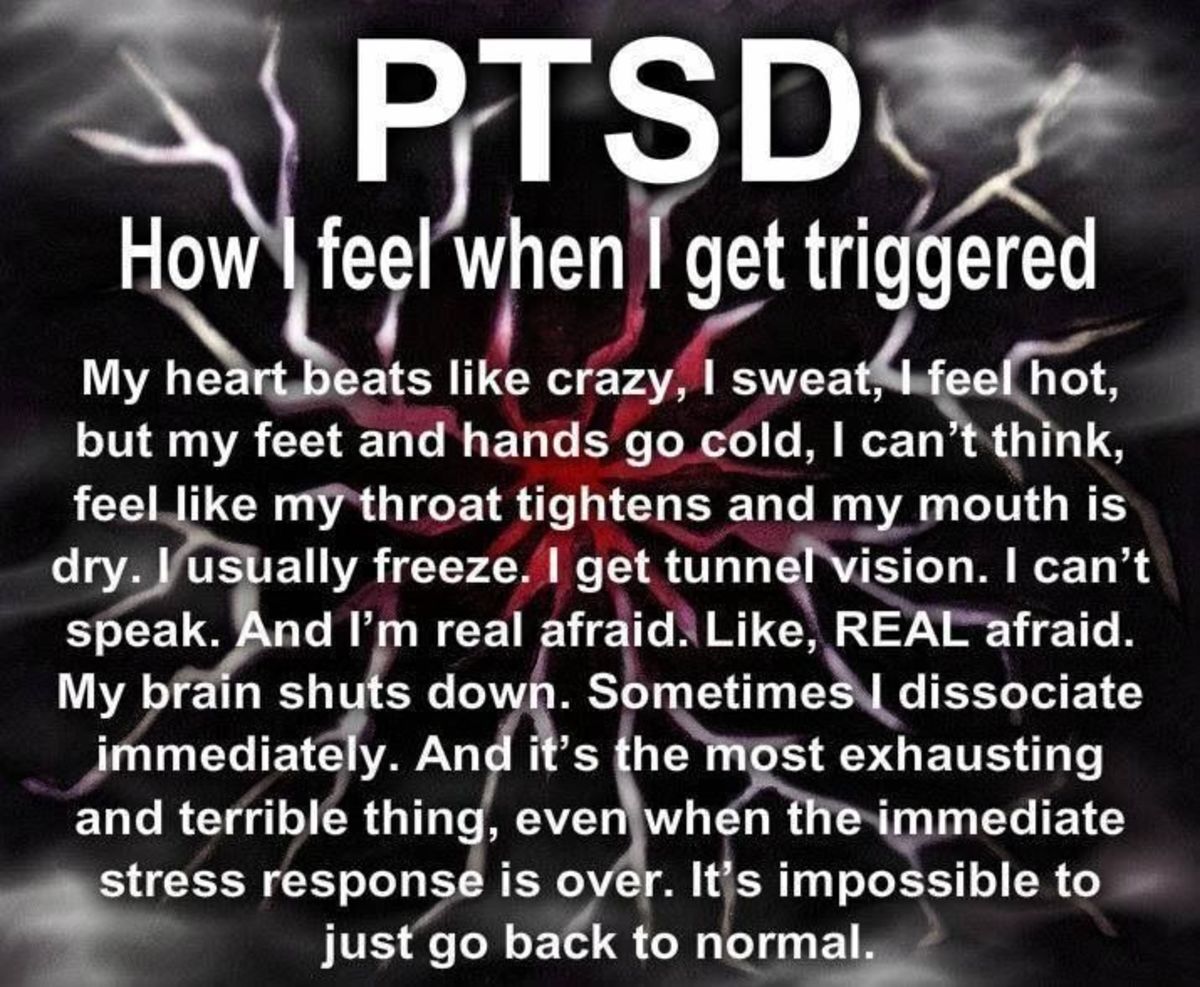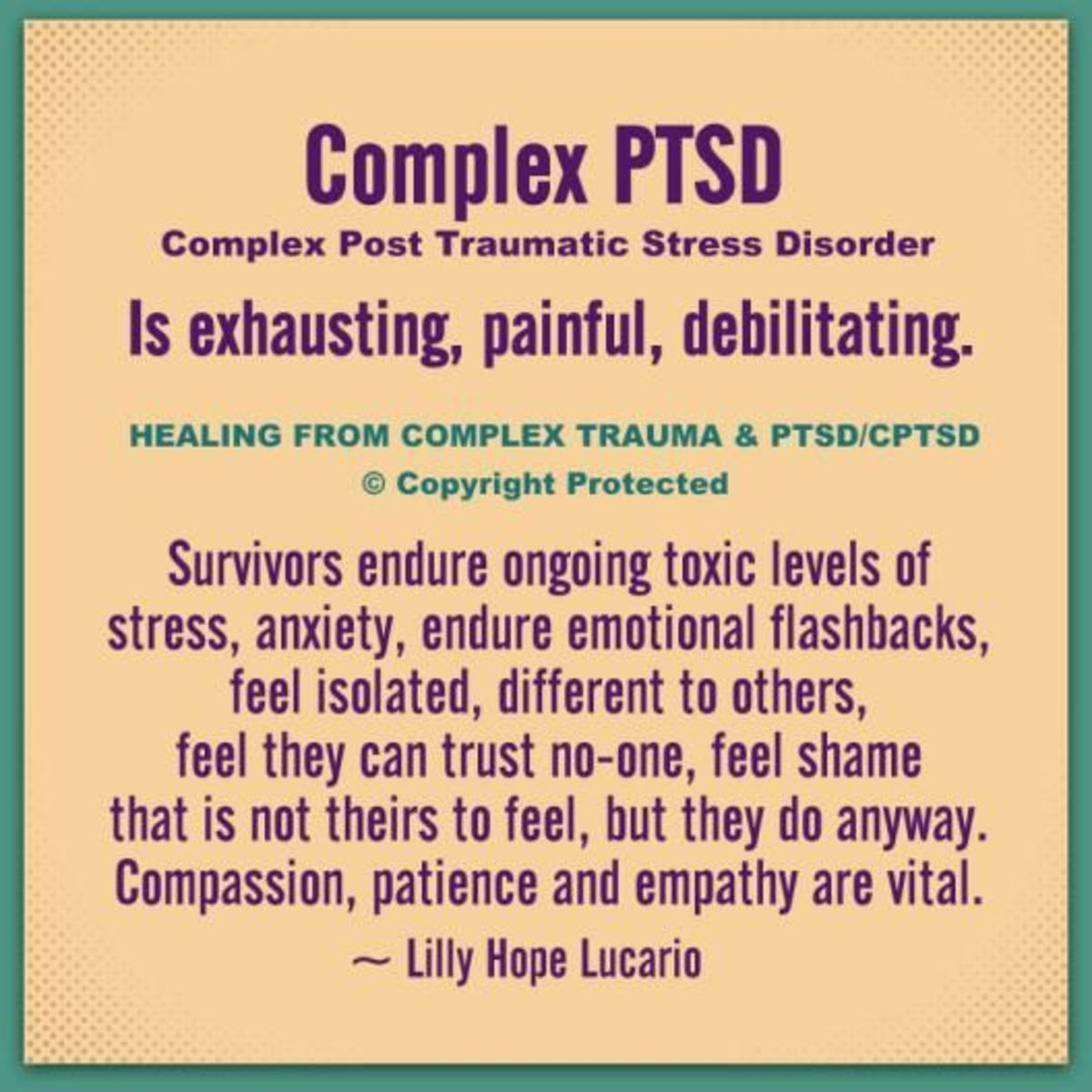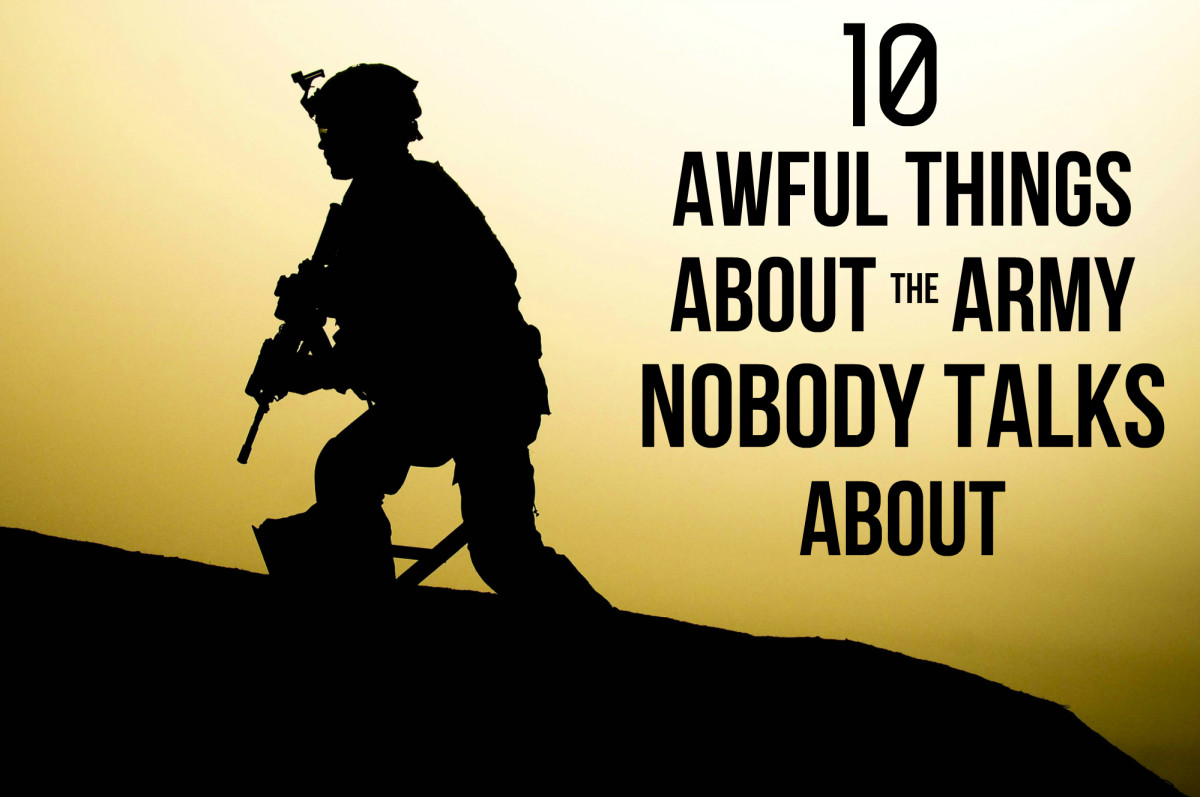Living with a combat veteran with PTSD: The Reality
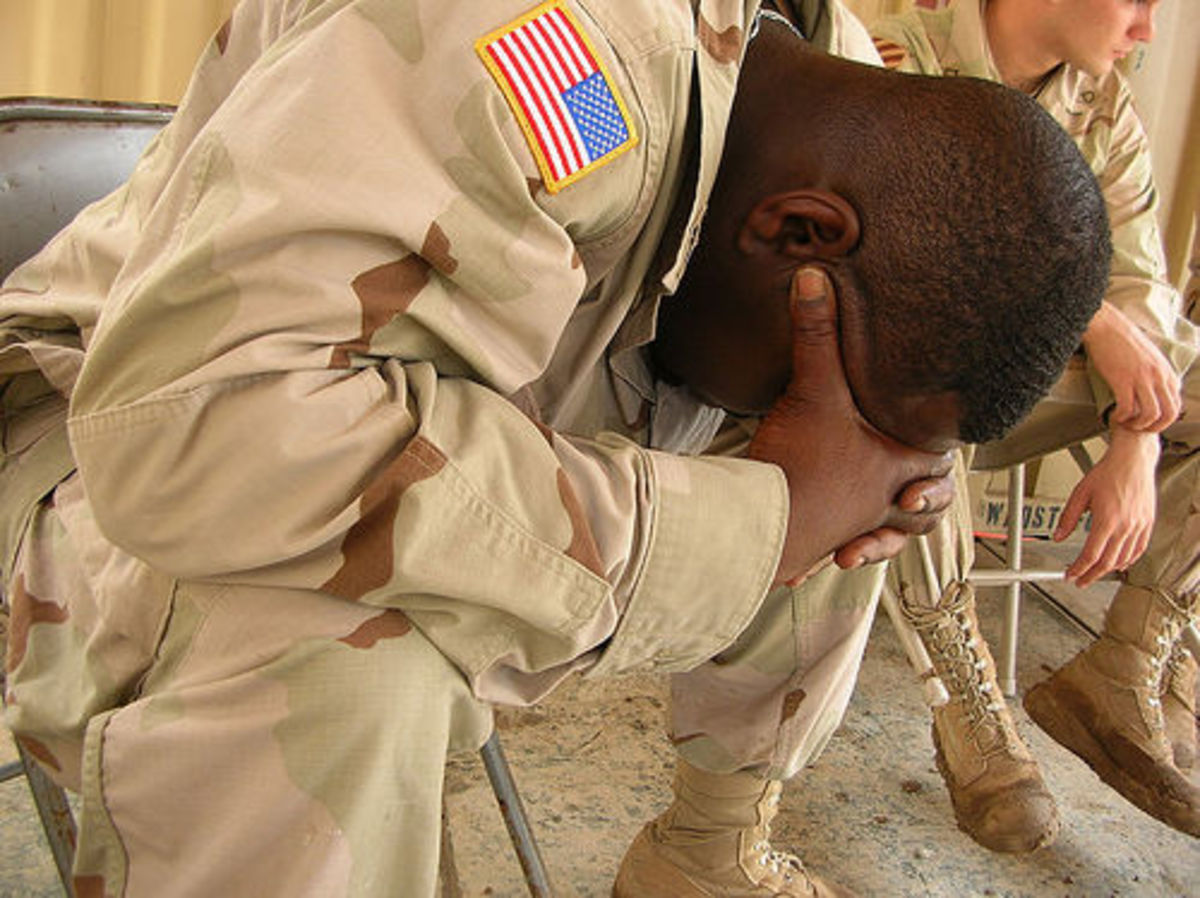
SGT DUNSON (Prior Service: PTSD)
Have you been diagnosed with PTSD?
2011: Iraq, U.S. Army, Post Traumatic Stress Disorder
PTSD: A REALITY OF WAR
The reality; one virtually ignored in the Army despite what you read in headlines, despite the programs and services and professionals they claim are there to "promote mental and family wellness", is that our soldier's are being diagnosed at an extremely high rate of PTSD.
Suicide rates in the Army are skyrocketing and have reached the highest percentage throughout the Army since, I believe, Vietnam. The other armed forces have not; even with increased deployments and extended tours, had the increase as significant as the Army. The Army needs "boots on ground" numbers to accomplish a mission for wartime deployments.
This is a reality my family has been affected by, one my neighbor's are affected by, why our divorce rates have increased to an already high level as it is, why affairs and domestic violence percents have increased. It is the reason spouses are diagnosed at higher rates and in more abundance for anxiety and depression. Substance abuse problems are a common and disheartening product of untreated and self medicated illness.
PTSD develops after seeing, being involved in or hearing an extremely traumatic stress-or. A person reacts to that experience with fear or a sense of hopelessness while on a regular basis reliving this traumatic event. They will do anything to avoid reminders of the even and can significantly effect very important areas of their life such as family or the work place. The cause for developing PTSD varies and effects everyone differently. Common reason today; War.
The highest rate in the Army. Soldier's diagnosed with PTSD are often veterans of multiple year long deployments. Some with extended rotations downrange such as when units were extended to 15 months in 2008-2009 on original orders because the high ranking brass that sit and discuss around a table the mission of the day; decided that there was too much home time and not enough war play. I say this in a sarcastic manner but its a fact broke down for Barney. They thought there was too much downtime and not enough war. Truthfully, do the soldier's even know why they are fighting for its certainly not our freedom they are fighting.
Other incidents or events may cause PTSD such as natural disasters like Hurricane Katrina and the San Francisco Earthquake in California in the 1970's. An assault, a rape, a molestation, a severe or fatal accident are all possible PTSD developing situations. I myself was diagnosed with PTSD at 20 years old when my 15 year old sister was killed on impact in a car accident in Fond Du Lac County Wisconsin. I was told by my husband and was the first death of anyone let alone family that I experienced. My life hasn't been the same. I stopped driving right away. After the funeral and going back to work I would have almost panic attacks trying to get in the car. I wouldn't let my son anywhere near a car and hardly had him in one. I had dreams of my son dying being hit by my car. I would collapse into hysterics if certain music from her funeral came on. After all these years; 12 now, I didn't think that PTSD would still effect me. Not until last year driving through Waco Texas to pick my children up from their father who was home on leave from Iraq, my husband still deployed, I saw a horrible accident. I began to shake uncontrollably and sweat and started crying as images were coming through my mind at me faster then I could even describe. I saw a man burnt from an accident getting loaded into a chopper and I don't remember getting the forty miles to Killeen. When I got out of the car my ex saw me asked me if I was okay. I said...." bad accident....burned...the man...can't live...no way" and was about to faint as he rushed the kids in the house and barely got me calm before I would have hit the ground.
PTSD is serious. Serious and Life long in some cases.
When you re-experience the event its most common as a plaguing thought or in a dream. Mine were mostly thoughts. My second husband nightmares from day one I was dating him that was a month after his first twelve month deployment and haven't truly ever stopped. Fluctuating between nightly and horrible to few and far between. First deployment he received a combat action badge for taking fire while driving a truck in a convoy to a camp my first husband was actually at. We used to joke about it. He is an 88M which means truck driver basically. He also was on something called PSD and did a lot of convoys so a lot of time of the FOB. (Excuse me if I get some of it a little mixed up, I believe its accurate but I am prior service Marine for a brief moment and a wife of one for eight to nine years; Army is not my forte.)
He was on a fifteen month deployment next rotation and a twelve again currently where he is a gunner on PSD. I can't begin to even tell you as I don't have a clue as to what he went through. My ex told me everything he would go through if I wanted to hear but my second one didn't tell me much. I just think it depends on a person and how they can deal with the experience.
Numbing of responsiveness or a state of hyper arousal is another common symptom.
We live in a reality that the soldier we send away is not the one that comes home. They never become the same and they leave yet again to come back even more different. Sometimes they appear as they were to most that know them but a wife or husband of a soldier will know. Many common statements and the most common one is the spouse that looks in their eyes and will comment " vacant " and " he's not there anymore " or even " my husband is not the same ". Not only do they come home from spending a year of their life in a sandpit with a routine and life they are now used to, they come home to a family that has functioned for a year without them. Kids that are a year older and babies born while they are away. They have expectations and we as the family; though we try not to, have expectations and when those expectations are not met, we go through emotional havoc inside.
Depression is expected, anxieties and worries, routines will be unfamiliar and chaotic situations almost painful. For everyone re-deployment is a process that is overwhelming but happy. Anxiety filled but joyous. Fact is they came home alive; but fact also remains they came home still wounded.

SOLDIER HARD: Musician and US Army Soldier
Spouse View on Re-Deployment Life
- " I CAN'T BELIEVE HE EXPECTED ME TO DO IT ALL HIS WAY WHILE HE WAS GONE, DOES HE NOT UNDERSTAND I AM JUST ONE AND DOESN'T HE UNDERSTAND...."
We all have a hope that reunion; homecoming, is exciting for us all. We live in anticipation and worry if we have done everything right. We try to look our best in hopes they will notice the new hair cut or that we lost weight. We want the kids to behave and the house to be perfect. We jump and run to pounce on daddy coming home and kiss our husband's hoping they never leave again. We make love and we lay in the arms of the one we can't ever imagine letting go again and do it all over still the following year.
The "honeymoon" phase doesn't last very long and truthfully I discourage immediate block leave of thirty days they get because they are so used to being with their other family of soldiers and not living anything close to this way of life that its a common problem I believe for why PTSD may develop symptoms faster and perhaps more intense because its too much of a dramatic change in daily routines.
I was very cautious last time he came back as we almost divorced. We had a lot of underlying issues to work through but even though we divorced this deployment I do believe in the end that PTSD was the cause. Not for the issues we had to get through but for the divorce. I believe that the Army never stopped to think that dropping six week; get out of Germany to Georgia right after you came back from fifteen months rotation, would not only hit me hard as I have problems with change - but the soldier.
Recently I found his screening and he had the symptoms that they didn't push for him to get any help and I don't know that he really thought he had any problems. But if the unit had this form then why didn't they stop that PCS so soon? Get him help? We get to the next one and its great he gets diagnosed but the damage was done.
I know I can't function the household the way we do when he is home. I have a complete change in how I and the kids do things so that I can function to the best of my ability. I have four kids, one stepson, a stepdaughter I refuse to deal with the mother and don't see. One the same age as my son. I have two of them on the Autism Spectrum. I fought for custody and my marriage that deployment. I fought my ex for not giving me my son's passport thus stranding me in the states. My husband was a mess dealing with my mess. But I did try to not expect too much and failed I supposed. I thought I was doing it right. Truth is I don't know that there is a right.
I know that I loved my husband, and I held him at night when his nightmares started again. ( Some can't be touched or they react as if being attacked; mine will unless you do it a certain way and he actually feels safe and ceases the nightmares that night ). I know that he tried to get help and then later denied his problem was PTSD instead he blamed me for everything he was leaving for. I don't believe he doesn't love me and never will. I see in his eyes vacant states where I believe he is trying to make sense of the world.
All you can do is love them. Love them, stand by them no matter what. Don't ever believe in your heart that what they say and do is really something the man you knew would do because deep down they are that man. They are a product of war that this country's government doesn't mind sacrificing. Love them even if you divorce. Always be the one that will be there to help them up. Being this is what makes you a true Army wife.
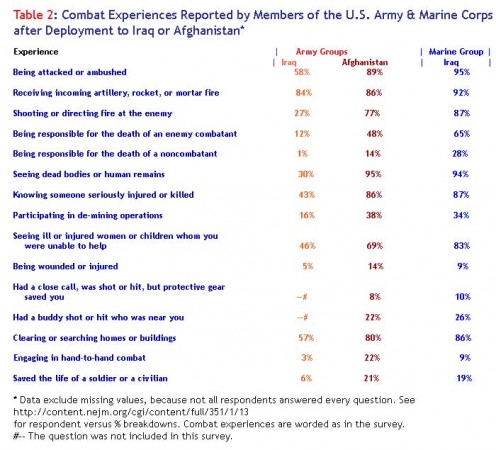
Excerpts of Data from Article's and Research Materials
A study was done by the National Bureau of Economic Research
between 2001-2006. The study took a random sample from servicemen and women all over the world in the four services (Army, Navy, Air Force, Marines) to assess PTSD. They find that the percentage of PTSD diagnoses among the active duty population varies by service. This percentage is less than 1 percent in all four services for those who are not deployed on Operation Enduring Freedom or Operation Iraqi Freedom missions.
Those deployed to Iraq/Afghanistan have a much higher probability of developing PTSD — from 1.3 percent for the Air Force to 6.5 percent for the Navy. Controlling for relevant background characteristics, the researchers find that deployment to Iraq/Afghanistan increases the odds of developing PTSD substantially, with the odds ratio ranging from 1.25 for the Air Force to 9.06 for the Navy.
Tour length also appears to matter: a deployment lasting longer than 180 days as compared to a short tour increases the odds of PTSD by 1.11 times to 2.84 times, depending on the service. For both the Army and the Navy, a deployment to Iraq/Afghanistan further exacerbates the adverse effect of tour length. (CALL OF DUTY)
The Department of Defense has been addressing PTSD. It introduced the Post-Deployment Health Reassessment (PDHRA) in March 2005, and it mandates the completion of this re-assessment at 90-180 days after a deployment. However, the authors’ data show that almost 75 percent of the PTSD population in their sample was not diagnosed with PTSD until 200 days after their last deployment. The average lapse between the last deployment and the first diagnosis of PTSD was 291 days. ( NATIONAL BEREAU OF ECONOMIC RESEARCH - FEB 7, 2011)
The Pentagon estimates that 30 percent of these returning veterans will be afflicted with Post Traumatic Stress Disorder (PTSD)
- Twelve percent of soldiers on their first deployment reported serious combat stress or depression symptoms, according to the disability council’s report. The figure rose to 19 percent for soldiers on their second downrange tour. By the third deployment, 27 percent of soldiers reported experiencing psychological difficulties.
- new study suggests that despite an expanded treatment focus by the Department of Veterans Affairs, fewer than 30 percent of veterans receive adequate care
- more than 230,000 Iraq and Afghanistan war veterans sought treatment for the first time at VA healthcare facilities nationwide between 2002 and 2008.
- Post-traumatic stress takes its toll on soldiers - El Paso Motherhood | Examiner.com
AP Photo/ Maya Alleruzzo In a recent series for The Gazette, a Colorado Springs, Colorado-based new source, a reporter went in-depth on the issue of Post Trauma - National Beurau of Economic Research
Where You Are Sent and for How Long Influences Post-Traumatic Stress Disorder

QOUTES FROM SOLDIER'S AND FAMILY AFFECTED BY PTSD
SPC WILLIAM MEDLIN, FORT DRUM NY, TO BE STATIONED AT FORT STEWART GEORGIA
"I was back from the patrol base — she said she actually noticed big changes in me. Changes in my personality. I don’t notice them, myself. I’m a pretty straightforward person, pretty levelheaded. Sometimes brutally blunt. I’m like a cougar when pushed in a corner," he said.
ANONYMOUS U.S. SOLDIER, SPC
“I hear that baby screaming in my nightmares,” he said in an article I wrote about his experiences.
JOHNATHAN NORELL, COMBAT MEDIC
"The things that affected me the most weren't the IEDs, which I went through six or seven of, and all the firefights, and all the combat," Norrell said. "It was the psychological stuff, the people I failed to help."
RESOURCES FOR HELP WITH PTSD
Military OneSource: Consultants provide information and make referrals on issues including combat stress and reintegration. Call 1-800-342-9647
U.S. Department of Veterans Affairs Readjustment Counseling Services:
Provides free services to combat veterans, even if still on active
duty. The VA also provides some free services to Family members of
combat veterans. Call 1-800-905-4675 EST and 1-866-496-8838 PST
Tricare: Active-duty members must have a referral from their primary care manager to receive mental-health services outside of a military hospital or clinic. However, military Family members and reservists or veterans who are covered by Tricare can go directly to a mental health care provider in the Tricare network without a referral or prior authorization for the first eight sessions.
Chaplain services: Chaplains can provide counseling, guidance and referral on many issues that affect returning servicemembers and their Families.
Your military support services: Each service branch sponsors information and support programs for servicemembers and their Families.
- Veterans Need Extended Care for PTSD | Psych Central News
A new study suggests that despite an expanded treatment focus by the Department of Veterans Affairs, fewer than 30 percent of veterans receive adequate care for - A family broken by war - News - Stripes
Spc. William Medlin is cooking himself some bacon and eggs in his unexpected new home, the barracks.
© 2011 Abby Rourk

